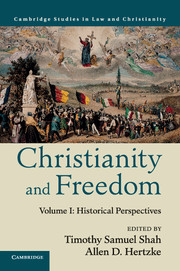Book contents
- Frontmatter
- The Religious Freedom Research Project
- Contents
- Contributing Authors
- Acknowledgments
- Introduction: Christianity and Freedom: Ancient Roots and Historical Innovations
- 1 The Roots of Religious Freedom in Early Christian Thought
- 2 The Christian Roots of Religious Freedom
- 3 Lactantius on Religious Liberty and His Influence on Constantine
- 4 Augustine and Religious Freedom
- 5 Christianity and the Roots of Human Dignity in Late Antiquity
- 6 Liberty of Conscience and Freedom of Religion in the Medieval Canonists and Theologians
- 7 Faith, Liberty, and the Defense of the Poor: Bishop Las Casas in the History of Human Rights
- 8 Calvinist Contributions to Freedom in Early Modern Europe
- 9 Constitutional Protection of the Freedom of Conscience in Colonial America: The Rhode Island and Pennsylvania Experiments
- 10 Christianity and Freedom in the American Founding
- 11 Vibrant Christian Pluralism and the Evolution and Defense of Religious Liberty in America
- 12 Orthodox Christian Contributions to Freedom: Historical Foundations, Contemporary Problematics
- 13 Christianity: A Straggler on the Road to Liberty?
- 14 Protestant Missionaries and the Centrality of Conversion Attempts for the Spread of Education, Printing, Colonial Reform, and Political Democracy
- 15 God and Freedom: Biblical Roots of the Western Idea of Liberty
- Index
5 - Christianity and the Roots of Human Dignity in Late Antiquity
Published online by Cambridge University Press: 05 May 2016
- Frontmatter
- The Religious Freedom Research Project
- Contents
- Contributing Authors
- Acknowledgments
- Introduction: Christianity and Freedom: Ancient Roots and Historical Innovations
- 1 The Roots of Religious Freedom in Early Christian Thought
- 2 The Christian Roots of Religious Freedom
- 3 Lactantius on Religious Liberty and His Influence on Constantine
- 4 Augustine and Religious Freedom
- 5 Christianity and the Roots of Human Dignity in Late Antiquity
- 6 Liberty of Conscience and Freedom of Religion in the Medieval Canonists and Theologians
- 7 Faith, Liberty, and the Defense of the Poor: Bishop Las Casas in the History of Human Rights
- 8 Calvinist Contributions to Freedom in Early Modern Europe
- 9 Constitutional Protection of the Freedom of Conscience in Colonial America: The Rhode Island and Pennsylvania Experiments
- 10 Christianity and Freedom in the American Founding
- 11 Vibrant Christian Pluralism and the Evolution and Defense of Religious Liberty in America
- 12 Orthodox Christian Contributions to Freedom: Historical Foundations, Contemporary Problematics
- 13 Christianity: A Straggler on the Road to Liberty?
- 14 Protestant Missionaries and the Centrality of Conversion Attempts for the Spread of Education, Printing, Colonial Reform, and Political Democracy
- 15 God and Freedom: Biblical Roots of the Western Idea of Liberty
- Index
Summary
Deeply rooted in our religious heritage is the conviction that every man is an heir to a legacy of dignity and worth. Our Judeo-Christian tradition refers to this inherent dignity of man in the Biblical term “the image of God.”
Martin Luther King Jr.RIGHTS AND ENLIGHTENMENT
Imagine, if you would, an Enlightenment that takes place in a Europe where there had never been a Constantine: no fiery sign in the sky, no Battle at the Milvian Bridge, no Nicaea. Imagine a thoroughgoing intellectual revolution, in which men “dared to know,” casting off half-believed myths of Zeus, demystifying all sacral kingships, seeking to understand the place of humanity in a mechanistic nature without superstition. Would such an Enlightenment have issued in the thunderous proclamations of the American and French Revolutions? The liberal revolutions of the late eighteenth century were the political offspring of the Enlightenment. The pronouncements of the inalienable rights of man were the avant-garde of modern ideology, and they now have triumphed as fundamental international norms. But would an Enlightenment without Constantine also have given birth to Enlightenment liberalism? Could we have had a Kant without a Constantine?
If you have indulged this lavish thought experiment so far, consider the answer of the Enlightenment's most acute critic, Friedrich Nietzsche: no. Proclamations of rights and human dignity were not a necessary political derivative of Enlightenment rationalism; rather, they were a relic, a secular myth born of weakness. “Such phantoms as the dignity of man, the dignity of labour, are the needy products of slavedom hiding from itself…. Now the slave must vainly scrape through from one day to another with transparent lies recognizable to every one of deeper insight, such as the alleged ‘equal rights of all’ or the so-called ‘fundamental rights of man,’ of man as such, or the ‘dignity of labour.’” For Nietzsche, humanity bore no inherent dignity: “‘Man in himself,’ the absolute man possesses neither dignity, nor rights, nor duties.” Only through culture, through art, could humans create beauty and meaning and thus come to possess dignity. Certainly this view set the illiberal Nietzsche apart from his age.
- Type
- Chapter
- Information
- Christianity and Freedom , pp. 123 - 148Publisher: Cambridge University PressPrint publication year: 2016
- 6
- Cited by

